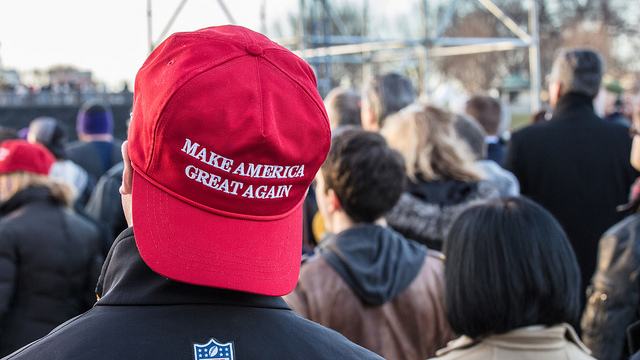Trump’s grand strategy

US President Donald Trump’s inability to think strategically is undermining longstanding relationships, upending the global order, and accelerating the decline of his country’s global influence—or so the increasingly popular wisdom goes. But this assessment is not nearly as obvious as its proponents—especially political adversaries and critics in the mainstream US media—claim.
America’s relative decline was a hot topic long before Trump took office. The process began when the United States, emboldened by its emergence from the Cold War as the world’s sole superpower, started to overextend itself significantly by enlarging its military footprint and ramping up its global economic and security commitments.
America’s ‘imperial overreach’ was first identified during President Ronald Reagan’s administration, which oversaw a frenetic expansion of military spending. It reached crisis levels with the 2003 US-led invasion and subsequent occupation of Iraq under President George W. Bush—a watershed moment that caused irreparable damage to America’s international standing.
On President Barack Obama’s watch, China rapidly expanded its global influence, including by forcibly changing the status quo in the South China Sea (without incurring any international costs). By that point, it was unmistakable: the era of US hegemony was over.
It is not just that Trump cannot be blamed for America’s relative decline; he may actually be set to arrest it. As unpredictable as Trump can be, several of his key foreign policy moves suggest that his administration is pursuing a grand strategy aimed at reviving America’s global power.
For starters, the Trump administration seems eager to roll back America’s imperial overreach, including by avoiding intervention in faraway wars and demanding that allies pay their fair share for defence. The fact is that many NATO members do not fulfill their spending commitments, effectively leaving American taxpayers to subsidise their security.
These are not new ideas. Before Trump even decided to run for office, pundits were arguing that the US needed to pursue a policy of retrenchment, drastically reducing its international commitments and transferring more of its defence burden onto its allies. But it was not until Trump, who views running a country much like running a business, that the US had a leader who was willing to pursue that path, even if it undermined the values that have long underpinned US foreign policy.
Trump’s focus on containing China—which FBI Director Christopher Wray recently labelled a far bigger challenge than Russia, even in the area of espionage—fits nicely into this strategy. Successive US presidents, from Richard Nixon to Obama, aided China’s economic rise. Trump, however, regards China not as America’s economic partner, but as ‘a foe economically’ and even, as the official mouthpiece China Daily recently put it, America’s ‘main strategic rival’.
In general, Trump’s tariffs aim to put the US back in control of its economic relationships by constraining its ballooning trade deficits, with both friends and foes, and bringing economic activity (and the accompanying jobs) back home. But it is no secret that, above all, Trump’s tariffs target China—a country that has long defied international trade rules and engaged in predatory practices.
Meanwhile, Trump is also working to ensure that China does not catch up with the US technologically. In particular, his administration seeks to thwart China’s ‘Made in China 2025’ program, the blueprint unveiled by the Chinese government in 2015 for securing global dominance over 10 strategic high-tech industries, from robotics to alternative-energy vehicles.
Trump’s diplomatic activities seem intended to advance this larger strategic vision of reversing America’s relative decline. He has tried to sweet-talk autocratic leaders, from North Korea’s Kim Jong-un to Russia’s Vladimir Putin, into making concessions—an approach that has garnered its share of criticism. But Trump’s compliments have not translated into kowtowing.
For example, despite all the controversy over Russia’s interference in the 2016 presidential election, the fact is that, since Trump took office, the US has expelled Russian diplomats, closed a Russian consulate, and imposed three rounds of sanctions on the country. His administration is now threatening to apply extraterritorial sanctions to stop other countries from making ‘significant’ defence deals with Russia, a leading arms exporter.
Trump has not flattered any foreign leader more than Chinese President Xi Jinping, whom he called ‘terrific’ and ‘a great gentleman’. Yet, again, when Xi refused to yield to Trump’s demands, the US president did not hesitate to hit back ‘using Chinese tactics’, including suddenly changing negotiating positions and unpredictably escalating trade tensions.
Even Trump’s direct approach with North Korea undermines China’s position by bypassing it. Trump is right that transforming the US – North Korea relationship matters more than securing complete denuclearisation. If he can co-opt North Korea, China’s only formal military ally, northeast Asian geopolitics will be reshaped and China’s lonely rise will be more apparent than ever.
There are plenty of problems with Trump’s methods. His brassy, theatrical and unpredictable negotiating style, together with his China-like disregard for international norms, are destabilising international relations. Domestic troubles like political polarisation and legislative gridlock—both of which Trump has actively exacerbated—also weaken America’s hand internationally.
But there is no denying that Trump’s muscular ‘America First’ approach—which includes one of the most significant military buildups since World War II—reflects a strategic vision that is focused squarely on ensuring that the US remains more powerful than any rival in the foreseeable future.
Perhaps more important, the transactional approach to international relations on which Trump’s strategy relies is likely to persist long after he leaves office. Friends and foes alike must get used to a more self-seeking America doing everything in its power, no matter the cost, to forestall its precipitous decline.